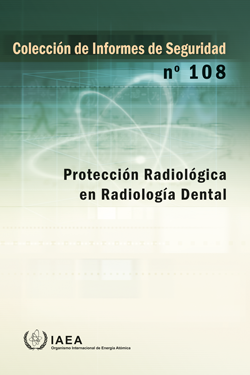 Radiation Protection in Dental Radiology
Radiation Protection in Dental RadiologyColección de informes de seguridad Nº 108 STI/PUB/1972, 133 pp.; 0 figures; 2025 |
 Manual on the Safe Production, Transport, Handling and Storage of Uranium Hexafluoride
Manual on the Safe Production, Transport, Handling and Storage of Uranium HexafluorideIAEA TECDOC Series No. 771/ Rev. 1 IAEA-TECDOC-771/Rev. 1, 150 pp.; 37 figures; 2025 |
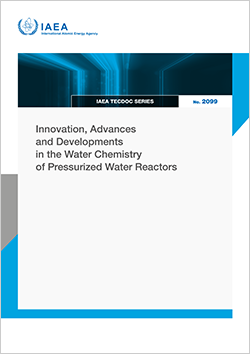 Innovation, Advances and Developments in the Water Chemistry of Pressurized Water Reactors
Innovation, Advances and Developments in the Water Chemistry of Pressurized Water ReactorsIAEA TECDOC Series No. 2099 IAEA-TECDOC-2099, 117 pp.; 81 figures; 2025 |
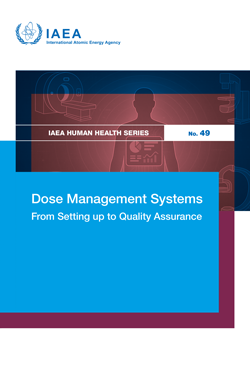 Dose Management Systems
Dose Management SystemsIAEA Human Health Series No. 49 This publication provides comprehensive guidance on dose management systems (DMS), an essential tool for advancing quality assurance, patient safety and optimization in medical imaging. DMS technology has become integral to modern clinical practice, enabling the collection, monitoring and evaluation of patient dose metrics and technical data from both ionizing and non-ionizing imaging modalities. Beyond dose tracking, these systems facilitate the optimization of imaging protocols, enhance quality management programmes and support regulatory compliance, which make them indispensable for improving diagnostic accuracy and patient care. This publication is targeted at health professionals, including clinically qualified medical physicists, medical radiation technologists, radiologists, nuclear medicine physicians and health managers. |
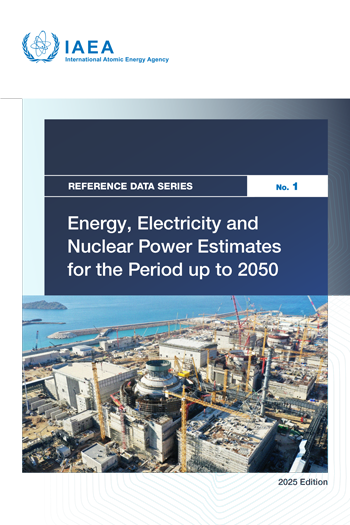 Energy, Electricity and Nuclear Power Estimates for the Period up to 2050
Energy, Electricity and Nuclear Power Estimates for the Period up to 2050Reference Data Series No. 1 The 45th edition of Reference Data Series No. 1 contains estimates of energy, electricity and nuclear power trends up to the year 2050. In deriving the nuclear capacity projections, all operating reactors, possible licence renewals, planned shutdowns, power uprates and plausible construction projects foreseen for the next few decades were considered. RDS-1 is organized into world and regional subsections, with global and regional nuclear power projections presented as low and high cases. The low case assumes that current market, technology and resource trends continue and there are few additional changes in explicit laws, policies and regulations affecting nuclear power. The low case projects a 50% increase in global nuclear capacity to 561 GW(e) by 2050, relative to a global operational capacity of 377 GW(e) in 2024. The high case is more ambitious, projecting an increase of 2.6 times the 2024 global operational capacity to 992 GW(e) by 2050. |
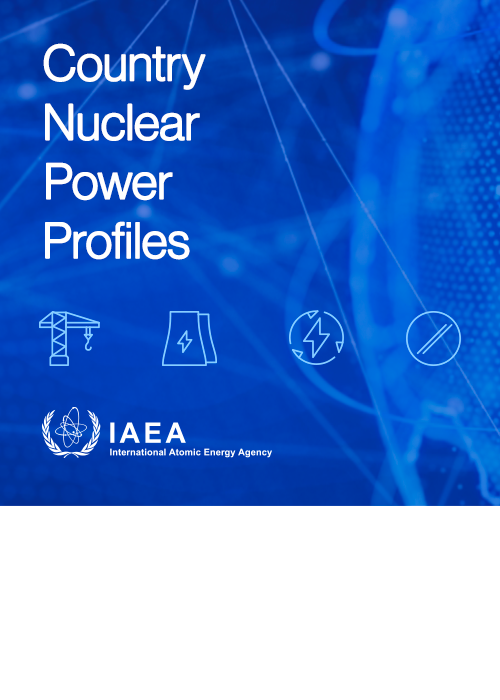 Country Nuclear Power Profiles
Country Nuclear Power ProfilesThe Country Nuclear Power Profiles (CNPP) provide background information on the status and development of nuclear power programmes of Member States. The CNPP's main objectives are to consolidate information on the nuclear power infrastructure and developments in participating countries, and serve as a resource in effective planning, decision making and implementation of nuclear power programmes that lead to the safe and economical operations of nuclear power plants. The CNPP summarizes organizational and industrial aspects of nuclear power programmes and provides information about the relevant legislative, regulatory, and international framework in each country. The descriptive and statistical overview of the overall energy and electricity situation in each country and its nuclear power framework are intended to serve as an integrated source of key background information about nuclear power programmes in the world. Statistical data about nuclear plant operations, energy and electricity use are drawn from national contributions and the IAEA's Power Reactor Information System (PRIS). The CNPP website is updated on an annual basis, with a complementary publication providing a high-level overview of programmes in participating Member States. Currently, it contains historical country information for 50 countries, including countries currently operating nuclear power plants, and countries with past or planned nuclear power programmes. The CNPP reports are updated based on information voluntarily provided by participating IAEA Member States. Each of the profiles in this publication is self-standing and contains information officially provided by the respective national authorities. From the 2020 edition onward, updated profiles cover Member States that are operating, expanding, or constructing nuclear power reactors in addition to those that were formerly operational. IAEA-CNPP/2025, 1 pp.; 1 figures; 2025, English, Web Publication  Full Text, (File Size: 10 KB). Full Text, (File Size: 10 KB). |
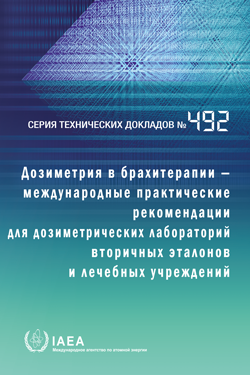 Dosimetry in Brachytherapy – An International Code of Practice for Secondary Standards Dosimetry Laboratories and Hospitals
Dosimetry in Brachytherapy – An International Code of Practice for Secondary Standards Dosimetry Laboratories and Hospitals????? ??????????? ???????? 492 STI/DOC/010/492, 175 pp.; 7 figures; 2025 |
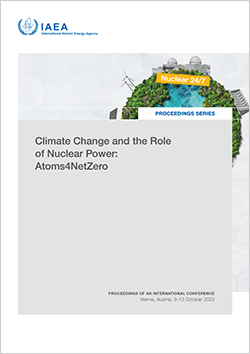 Climate Change and the Role of Nuclear Power: Atoms4NetZero
Climate Change and the Role of Nuclear Power: Atoms4NetZeroProceedings Series STI/PUB/2118, 64 pp.; 0 figures; 2025 |
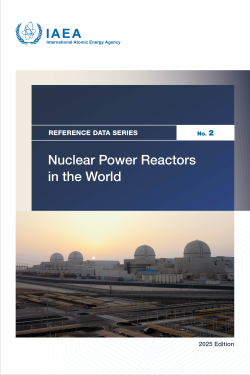 Nuclear Power Reactors in the World
Nuclear Power Reactors in the WorldReference Data Series No. 2 This is the 45th edition of Reference Data Series No. 2, which presents the most recent reactor data available to the IAEA. It contains summarized information as of the end of 2024 on power reactors operating, under construction and shut down as well as performance data on reactors operating in the IAEA Member States. The information is collected through designated national correspondents in the Member States and the data are used to maintain the IAEA's Power Reactor Information System (PRIS). |
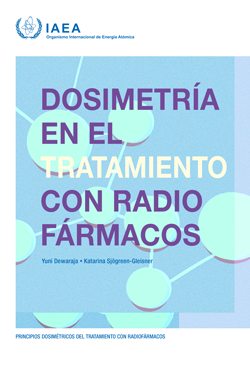 Dosimetry for Radiopharmaceutical Therapy
Dosimetry for Radiopharmaceutical TherapySTI/PUB/2065, 350 pp.; 75 figures; 2025 ISBN 978-92-0-337724-9, Spanish. 70.00 Euro. Date of Issue: 9/11/2025.  Full Text, (File Size: 8842 KB). Full Text, (File Size: 8842 KB). |
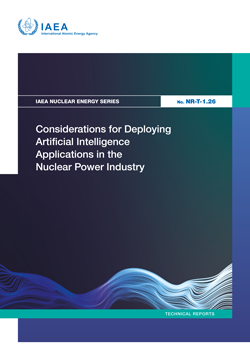 Considerations for Deploying Artificial Intelligence Applications in the Nuclear Power Industry
Considerations for Deploying Artificial Intelligence Applications in the Nuclear Power IndustryIAEA Nuclear Energy Series No. NR-T-1.26 The increasing adoption of artificial intelligence (AI) across industries has unveiled its transformative potential for enhancing the safety, security, efficiency and reliability of nuclear power plants (NPP). While AI technologies are advancing rapidly in various fields, their adoption in the nuclear power industry remains in the nascent stages, characterized by pilot projects and limited deployment. This publication provides general guidance on the aspects that need addressing when deploying AI applications in NPPs. It presents the latest information, up to date best practices, experiences, benefits and challenges related to AI in the life cycle of NPPs. |
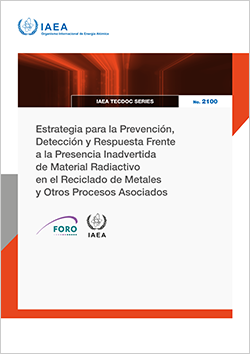 Estrategia para la Prevención, Detección y Respuesta Frente a la Presencia Inadvertida de Material Radiactivo en el Reciclado de Metales y Otros Procesos Asociados
Estrategia para la Prevención, Detección y Respuesta Frente a la Presencia Inadvertida de Material Radiactivo en el Reciclado de Metales y Otros Procesos AsociadosIAEA Tecdoc (Ed. española) Nº 2100 This IAEA FORO document contributes to the development of criteria, frameworks and strategies aimed at improving radiological control mechanisms within the metal recycling industry. Its objective is to help reduce the radiological risk associated with the inadvertent presence of radioactive materials, particularly in key areas such as ports, border controls, steel mills and throughout the recycling chain, including smelters, fragmenters, collectors and scrap yards. This publication aims to strengthen the knowledge and training of all participants in the recycling process. It outlines specific procedures and structures for the correct management of detected radioactive materials and promotes the development of effective response mechanisms in different situations. |
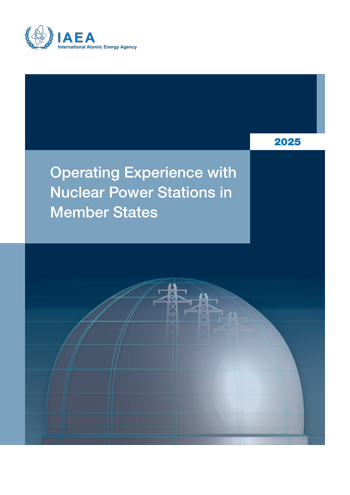 Operating Experience with Nuclear Power Stations in Member States 2025 Edition
Operating Experience with Nuclear Power Stations in Member States 2025 EditionOperating Experience This report contains the 56th edition of the IAEA’s series of annual reports on operating experience with nuclear power plants in Member States. It is a direct output from the IAEA’s Power Reactor Information System (PRIS) and contains information on electricity production and overall performance of individual plants during 2024. In addition to annual information, the report contains a historical summary of performance during the lifetime of individual plants and figures illustrating worldwide performance of the nuclear industry. The design characteristics and dashboards of all operational nuclear power plants worldwide are also included. |
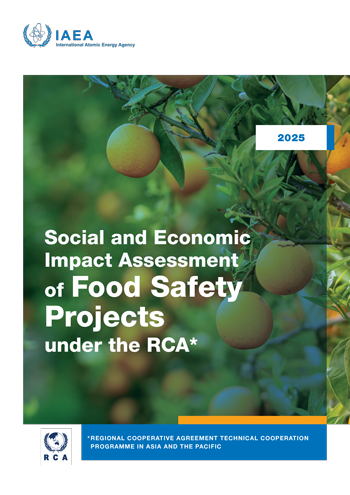 Social and Economic Impact Assessment of Food Safety Projects under the RCA
Social and Economic Impact Assessment of Food Safety Projects under the RCAThis report evaluates the social and economic impacts of food safety programmes implemented from 2020 to 2024, supported by the IAEA under the Regional Cooperative Agreement for Research, Development and Training related to Nuclear Science and Technology for Asia and the Pacific (RCA). It is one of four thematic assessments examining the application of nuclear science and technology in air quality monitoring, food safety, isotope hydrology and nuclear medicine. Drawing on evidence from 19 participating State Parties, IAEA administrative data, expert analysis, five success case stories and a comprehensive cost-benefit assessment, the report illustrates how technical cooperation in food safety has advanced sustainable development across Asia and the Pacific. This publication highlights the achievements of the regional collaboration, delivering results that exceed what individual countries could achieve alone. It offers a compelling demonstration of science in action, advancing health and environmental and economic benefits through the peaceful application of nuclear science and technologies under RCA programmes. IAEA/PAT/009, 127 pp.; 42 figures; 2025, English. 0.00 Euro. Date of Issue: 9/11/2025.  Full Text, (File Size: 1919 KB). Full Text, (File Size: 1919 KB). |
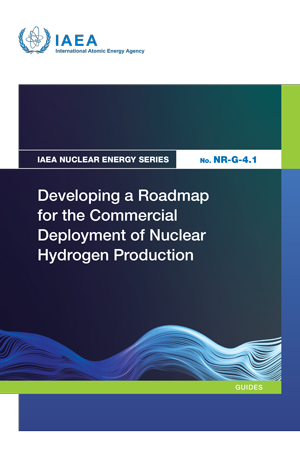 Developing a Roadmap for the Commercial Deployment of Nuclear Hydrogen Production
Developing a Roadmap for the Commercial Deployment of Nuclear Hydrogen ProductionIAEA Nuclear Energy Series No. NR-G-4.1 Developing a roadmap for the commercial deployment of nuclear hydrogen production provides a useful management tool for planning and strategizing the development of nuclear hydrogen projects. This publication covers the role of the hydrogen economy in global decarbonization efforts, as well as the potential that nuclear energy has in supporting the production of hydrogen for which high increases in demand are predicted. The publication is intended for experts in hydrogen and energy decarbonization using hydrogen, interested Member States and stakeholders in nuclear hydrogen projects, including executives and strategic decision makers within utilities currently operating nuclear power plants, and for policy makers and end users. |